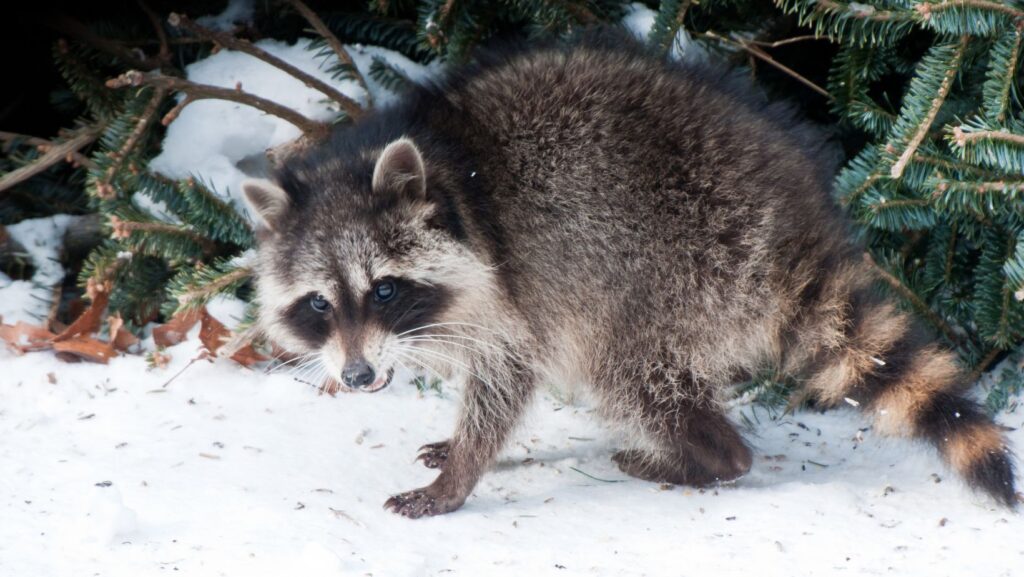
Raccoons seek shelter during winter, often making your home their refuge. Effective winter raccoon removal strategies involve sealing entry points, using traps, and employing repellent methods to keep these pests at bay. Understanding their behavior and preferences can help you take preventative measures before they settle in.
To begin, inspect your property for potential entryways. Raccoons can squeeze through surprisingly small gaps, so reinforcing doors, windows, and vents is crucial. Additionally, setting up humane traps can help relocate unwelcome guests safely and legally.
When it comes to repelling raccoons, natural deterrents can be effective. Consider using strong scents like peppermint oil or vinegar near entry points. Keeping your yard and outdoor spaces clean will also minimize food sources that attract them in the first place. By implementing these strategies, you can protect your home from winter raccoon invasions.
Understanding Raccoon Behavior in Winter
During winter, raccoon behavior changes significantly as they adapt to colder conditions. These adaptations impact their habits and the challenges you may face regarding winter wildlife removal.
Raccoon Habits During the Cold Months
As temperatures drop, raccoons tend to enter a state known as torpor. This is not true hibernation but rather a period of reduced activity and lowered metabolic rate. You may notice them seeking shelter in attics, basements, or other cozy places to stay warm.
Raccoons are primarily nocturnal but may alter their activity patterns in winter, sometimes becoming more active during warmer days or when foraging for food. They rely on their fat reserves, built up during the warmer months, which helps them survive periods when food is scarce. This behavior poses challenges for homeowners considering raccoon control for cold months in Frisco.
Impact of Winter on Raccoon Activity
The harsh winter environment influences raccoon movement and feeding habits. Availability of food sources can decline, prompting raccoons to venture out during the day if nighttime foraging proves unsuccessful. They often scavenge through garbage or seek out pet food left outside, which increases the likelihood of human-wildlife conflict.

Your property may become an attractive target for these animals, especially if you are not vigilant with waste management. Implementing winter wildlife removal tips such as securing trash bins and closing access points can minimize their presence. Understanding these behavioral patterns is crucial for effective winter raccoon removal strategies.
Effective Home Protection Strategies
To keep your home safe from raccoons during winter, it’s essential to secure entry points and perform regular home inspections. This proactive approach helps deter potential intruders and ensures your living space remains protected.
Securing Entry Points
Raccoons are skilled at finding ways into your home, especially during colder months when they seek warmth and shelter. Start by inspecting potential entry points such as doors, windows, and vents.
- Seal Cracks and Gaps: Use caulk or expanding foam to fill any cracks in walls or foundations. Raccoons can squeeze through openings as small as 4 inches.
- Install Secure Screens: Use metal mesh or hardware cloth over vents and windows. Ensure that they are securely attached to prevent any openings.
- Check Doors and Windows: Make sure doors and windows close tightly. Consider adding door sweeps or weather stripping to eliminate gaps.
- Secure Trash Cans: Store garbage in raccoon-proof containers. Consider using bins with locking lids to minimize access.
By reinforcing these entry points, you can significantly reduce the chances of raccoons entering your home.
Winter Home Inspection Checklist
A thorough winter home inspection is vital for maintaining a raccoon-proof environment. Follow this checklist to ensure your home is safe:
Roof Inspection: Check for loose shingles or openings where raccoons could enter. Repair any damages promptly.
Attic and Crawl Space: Ensure these areas are off-limits to wildlife by sealing all entrance points. Inspect for signs of raccoon activity.
Landscaping: Trim trees and shrubs that overhang your roof or touch your home’s exterior. This reduces climbing routes for raccoons.
Outdoor Food Sources: Remove pet food and bird seed from outside. Secure compost bins and clean up any fallen fruit from trees.
By conducting these inspections regularly, you can proactively keep raccoons out in winter and maintain a secure home environment.
Raccoon Deterrence and Removal Methods
To effectively manage raccoon issues, humane trapping techniques and natural repellents are essential.

These methods can help prevent potential damage to your property and reduce unwanted encounters during winter in Frisco.
Humane Trapping Techniques
Humane traps are a favored choice for removing raccoons without causing them harm. You can obtain these traps from hardware stores or online retailers. It’s crucial to follow specific guidelines for using them effectively:
- Placement: Position the trap near raccoon entry points or along their common paths.
- Bait: Use appealing bait such as peanut butter, marshmallows, or fruits to attract raccoons into the trap.
- Monitoring: Check traps frequently to minimize stress for the captured raccoon.
Once trapped, relocate the raccoon to a suitable area far from your property. Be aware of your local regulations regarding wildlife relocation. For expert assistance, consider contacting Critter Stop at (214) 234-2616 for a free inspection and their specialized removal services.
Natural Repellents
Natural repellents can effectively deter raccoons without the need for harsh chemicals. Here are some options to consider:
- Scents: Raccoons dislike strong smells. Use products like vinegar, garlic, or cayenne pepper spread around potential entry points.
- Motion-Activated Sprayers: These devices release a burst of water when they detect movement, startling raccoons and encouraging them to leave.
- Electric Fencing: Installing electric fencing around gardens can be a barrier to protecting your property from raccoons.
Implementing these natural deterrents can significantly reduce encounters with raccoons during winter. For a comprehensive approach to wildlife management, contact Critter Stop, known for its high-quality services and excellent customer reviews in wildlife removal.



